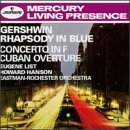| All Artists: Gershwin, List, Hanson Title: Rhapsody in Blue / Cuban Overture Members Wishing: 0 Total Copies: 0 Label: Polygram Records Release Date: 11/15/1994 Genres: Special Interest, Classical Styles: Marches, Forms & Genres, Concertos, Theatrical, Incidental & Program Music, Historical Periods, Modern, 20th, & 21st Century, Instruments, Keyboard Number of Discs: 1 SwapaCD Credits: 1 UPC: 028943434126 |
Search - Gershwin, List, Hanson :: Rhapsody in Blue / Cuban Overture
 | Gershwin, List, Hanson Rhapsody in Blue / Cuban Overture Genres: Special Interest, Classical
|
Larger Image |
CD Details |
CD ReviewsExtraordinary David Saemann | 03/31/2008 (5 out of 5 stars) "This is the best recording I've ever heard of Gershwin's two big piano works. Eugene List is just phenomenal. He plays with a big, steely sound, but has plenty of feeling for the jazzy accents of both works. I can't praise Howard Hanson's contribution enough. The orchestra simply speaks Gershwin, in a manner that only a great conductor who absorbed this music and the influences on it in his youth could bring off. Hearing Hanson conduct Gershwin is like hearing Serafin conduct Verdi, so complete is the identification with the composer. The sound engineering is some of the best Mercury produced in Rochester, wide ranging with plenty of detail. I do question what Stars and Stripes is doing here, although it is a good performance with a student orchestra. Nevertheless, this is essential listening for the Gershwinaholic, as iconic in its way as Oscar Levant's performances." Solid performances of the "big works" ... the Cuban Overture Classic Music Lover | Maryland, USA | 10/18/2008 (5 out of 5 stars) "Eugene List made several recordings of the Rhapsody, but this was the one he recorded using Ferde Grofe's "conventional" symphonic arrangement. Another one he made later with the Berlin Symphony was of the original jazz orchestration. I like this rendition fine but prefer List in the Berlin performance. As for the Concerto, this is a solid reading, with big arches of sound that don't scrimp on the jazz idiom and rhythmic propulsion. Hanson and the ERSO forces have a nice bite, and I like the immediacy of the sound compared to so many other "washed out" renditions.
Turning to the Cuban Overture, I think this is the most interesting interpretation on the disk. Hanson's take on this music may seem less thrilling at first blush, until you realize just what he is doing. Instead of the "mad rush" of sound and tempi that you typically hear conductors do with the piece, Hanson takes things a bit slower, emphasizing the dancelike elements of the work. And of course, when we discover that Gershwin's original name for this piece was "Rhumba," it all makes sense. Recall the dance sequences in Andy Garcia's movie "The Lost City," and the genius of Hanson's interpretation becomes clear. Nowhere is this more evident than in the final measures of the work, where Hanson builds gradually and deliberately to those final five repeated chords that in themselves completely capture the "essence" of Cuban dance. Compare this to the misguided efforts of conductors like Slatkin, Levine, Fiedler and others, whose "mad dashes to the finish line" create nothing but a blobby orchestral mess. After you hear Hanson's interpretation, no other performance of the Cuban Overture will do (except maybe Eduardo Mata's with the Dallas Symphony on RCA/BMG)." |

 Track Listings (6) - Disc #1
Track Listings (6) - Disc #1